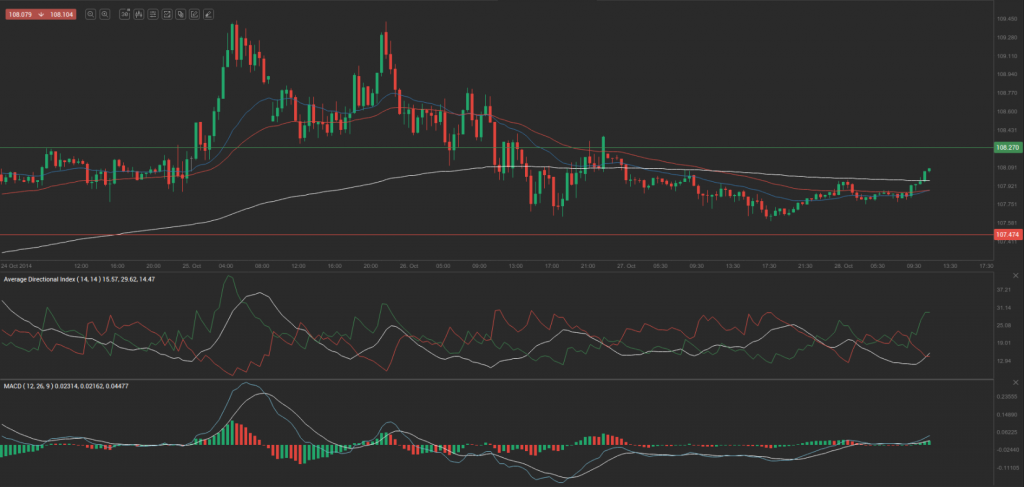Yesterday’s trade saw USD/JPY within the range of 107.58-108.38. The pair closed at 107.81, losing 0.34% on a daily basis.
At 10:02 GMT today USD/JPY was up 0.24% for the day to trade at 108.07. The pair touched a daily high at 108.08 at 10:03 GMT.
Fundamentals
United States
Orders for durable goods
Durable goods orders in the United States probably rose 0.6% in September compared to a month ago, according to the median forecast by experts. In August new orders for manufactured durable goods dropped at a pace of 18.4%, a revision down from an 18.2% drop previously, to reach USD 245.4 billion USD. Excluding defense, new orders fell 19.0% in August. Transportation equipment, also down, following two consecutive monthly increases, was the main driver behind the overall decrease, with orders falling 42.0% to reach USD 76.8 billion, according to data by the US Census Bureau. Inventories of manufactured durable goods, up during sixteen of the last seventeen months, rose 0.4% to USD 403.0 billion in August. Non-defense new orders for capital goods decreased 36.3% to USD 86.8 billion during the same month.
Durable goods orders, as an indicator, gauge the strength of US manufacturing sector and represent a major portion of nations factory orders. This is a closely watched report on manufacturing activity, because durable goods are the first type of goods to be affected by an economic downturn or upturn.
Durable goods are designed to last three or more years and encompass aircraft, automobiles and buses, cranes, machine parts, appliances etc. More than 85 industries are represented in the sample, which covers the entire United States. The logic behind this indicator is that consumers need to be very optimistic in order to buy an automobile in comparison with, for example, first necessities such as food or clothing. Therefore, durable goods are among the first goods, which a consumer may abstain from purchasing, in case overall economic activity begins to contract. The same is valid for company purchases. During a recession, an airliner is less likely to purchase new planes and as factory output contracts, it is less likely to purchase new machines.
Durable goods orders, which exclude transportation, probably rose 0.5% in September, following a revised down 0.4% increase in August (0.7% gain previously). Large ticket orders, such as automobiles for civil use or aircraft, are not present in the calculation, as their value may be in a wide range. This way the index provides a more reliable information in regard to orders of durable goods.
In case orders increased at a faster pace than projected, this would certainly have a bullish effect on the greenback. US Census Bureau is scheduled to release the official numbers at 12:30 GMT.
Consumer confidence index by the CB
Confidence among consumers in the United States probably slightly improved in October, with the corresponding index coming in at a reading of 87.0 from 86.0 in September. The latter has been the lowest value since June, when the index stood at 85.2.
This indicator measures the level of individuals confidence in the US economic activity. It is considered as a leading indicator, as it gives an early insight into consumer spending, which accounts for most of the nations GDP. Confidence is measured on a scale of -100 to +100. A reading of -100 implies a lack of confidence, while a reading of 100 is indicative of extremely high confidence. Zero values imply neutrality. In case the index improved more than anticipated, this might provide support to the US dollar, as higher confidence suggests greater willingness to spend and, respectively, accelerated economic growth. The Conference Board research group is to publish the official index reading at 14:00 GMT.
Japan
The preliminary estimate of the index of industrial production in Japan probably showed a 2.2% expansion in September compared to a month ago, following a 1.9% drop in August, according to final data. If so, this would be the fastest rate of output increase since January, when production climbed at a pace of 3.9%. Annualized industrial output contracted at a pace of 3.3% in August, or the most since June 2013.
The index, reflecting business cycle, measures the change in overall inflation-adjusted value of output in sectors such as manufacturing, mining and utilities. In case industrial output expanded more than anticipated, this would support demand for the Japanese yen. The Ministry of Economy, Trade and Industry is to publish the official industrial data at 23:50 GMT.
Pivot Points
According to Binary Tribune’s daily analysis, the central pivot point for the pair is at 107.92. In case USD/JPY manages to breach the first resistance level at 108.27, it will probably continue up to test 108.72. In case the second key resistance is broken, the pair will probably attempt to advance to 109.07.
If USD/JPY manages to breach the first key support at 107.47, it will probably continue to slide and test 107.12. With this second key support broken, the movement to the downside will probably continue to 106.67.
The mid-Pivot levels for today are as follows: M1 – 106.90, M2 – 107.30, M3 – 107.70, M4 – 108.10, M5 – 108.50, M6 – 108.90.
In weekly terms, the central pivot point is at 107.58. The three key resistance levels are as follows: R1 – 108.95, R2 – 109.73, R3 – 111.10. The three key support levels are: S1 – 106.80, S2 – 105.43, S3 – 104.65.






